Elevated radon levels pose serious health risks, but understanding how to address radon concerns will help you maintain a safe living environment. Discover what to do if your home tests high for radon to ensure safety and peace of mind for you and your family.
Schedule a Professional Radon Assessment
If you discover elevated radon levels in your home, schedule a professional assessment as soon as possible. Attempting DIY solutions without the necessary expertise can lead to incomplete or ineffective radon mitigation.
Certified radon professionals have the tools and knowledge to accurately assess your home’s radon levels. They can identify the gas’s entry points and recommend tailored solutions for addressing the issue. For affordable radon reduction services, you can contact our team at Affordable Radon Services.
Enhance Ventilation in Your Home
Another thing to do if your home tests high for radon is improve the ventilation. Increased airflow helps disperse accumulated radon, which reduces its concentration levels indoors.
Consider installing mechanical ventilation systems, which can replace radon-laden air with fresh outdoor air. Simple actions, like opening windows and using fans, can also enhance natural ventilation and make your home safer.
Seal Cracks and Openings
Radon often enters a home through cracks in the floors and walls, particularly in the basement. Sealing these openings properly can prevent radon infiltration.
Use an appropriate caulking or sealant to address visible cracks and gaps in your home’s foundation. Before applying caulking or sealant, be sure to clean the surface thoroughly to ensure proper adhesion.
For a concrete foundation, a polyurethane caulking or sealant would be suitable, as it can adhere to both porous and non-porous surfaces and has high durability and flexibility. Carefully follow the instructions on the packaging to prepare the product for use, and use a caulk gun or putty knife to apply an even layer of caulking or sealant over every crack or gap.
Conduct Regular Radon Testing
Ongoing radon monitoring is necessary after mitigation efforts to make sure the gas levels remain within acceptable limits. Regular testing can confirm the effectiveness of your mitigation efforts as well as identify any new issues.
Ideally, you should conduct radon tests annually or biannually to stay informed about the radon levels in your home. By maintaining this awareness, you can support ongoing protection and address any changes promptly.
Testing high for radon calls for immediate action to maintain your home’s safety. Professional assessments and increased ventilation are among several key strategies for reducing radon. Furthermore, addressing radon proactively protects your family and enhances your home’s safety.
At Affordable Radon Services, we have over 10 years of experience dealing with radon issues, and we use the best materials and industry products to help reduce radon levels in homes. Start the mitigation process by scheduling a radon test with us today.


Recent Comments